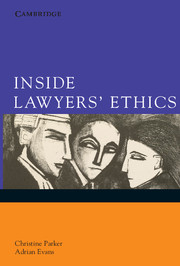Book contents
- Frontmatter
- Contents
- Preface
- Acknowledgments
- List of tables
- List of figures
- List of illustrations
- List of case studies
- Table of statutes
- Table of cases
- 1 Introduction: Values in Practice
- 2 Alternatives to Adversarial Advocacy
- 3 The Responsibility Climate: Regulation of Lawyers' Ethics
- 4 Civil Litigation and Excessive Adversarialism
- 5 Ethics in Criminal Justice: Proof and Truth
- 6 Ethics in Negotiation and Alternative Dispute Resolution
- 7 Conflicting Loyalties
- 8 Lawyers' Fees and Costs: Billing and Over-Charging
- 9 Corporate Lawyers and Corporate Misconduct
- 10 Conclusion – Personal Professionalism: Personal Values and Legal Professionalism
- Index
- References
8 - Lawyers' Fees and Costs: Billing and Over-Charging
- Frontmatter
- Contents
- Preface
- Acknowledgments
- List of tables
- List of figures
- List of illustrations
- List of case studies
- Table of statutes
- Table of cases
- 1 Introduction: Values in Practice
- 2 Alternatives to Adversarial Advocacy
- 3 The Responsibility Climate: Regulation of Lawyers' Ethics
- 4 Civil Litigation and Excessive Adversarialism
- 5 Ethics in Criminal Justice: Proof and Truth
- 6 Ethics in Negotiation and Alternative Dispute Resolution
- 7 Conflicting Loyalties
- 8 Lawyers' Fees and Costs: Billing and Over-Charging
- 9 Corporate Lawyers and Corporate Misconduct
- 10 Conclusion – Personal Professionalism: Personal Values and Legal Professionalism
- Index
- References
Summary
Introduction: Legal Fees and Access to Justice
Clients are more likely to complain about their lawyers' fees and costs than any other issue, and even the most conscientious lawyers have trouble controlling costs and explaining them to clients. Typical complaints include that the lawyer has failed to make proper disclosure of likely costs at the commencement of the matter, failed to even provide a written bill, failed to provide an itemised bill once requested, or charged for the preparation of an itemised bill. Deliberate gross over-charging also features prominently among client complaints, as does the withdrawal of costs from a client's trust account without their permission, or in the absence of a proper bill. Clients complain about lawyers who charge costs in relation to litigation matters that amount to more than the amount actually recovered in litigation. Also featuring prominently among client complaints about lawyers are complaints about excessive hourly billing rates and exploitation of ‘no-win, no fee’ agreements. Clients routinely complain that they have been promised that they will incur no fees unless they win, but find themselves losing and having to pay the costs of the other side, or disagreeing with their lawyer about whether there has been a ‘win’. One Queensland lawyer was suspended for twelve months for gross over-charging for billing a ‘no-win, no fee’ client $300 per hour plus a premium of 25% for all work done by any employee of the firm, from partner to paralegal to secretary.
- Type
- Chapter
- Information
- Inside Lawyers' Ethics , pp. 182 - 211Publisher: Cambridge University PressPrint publication year: 2007



